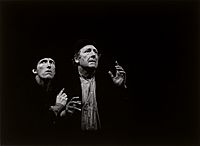Waiting for Godot facts for kids
Quick facts for kids Waiting for Godot |
|
|---|---|

En attendant Godot, staging by Otomar Krejca, Avignon Festival, 1978
|
|
| Written by | Samuel Beckett |
| Characters | Vladimir Estragon Pozzo Lucky A Boy |
| Mute | Godot |
| Date of premiere | 5 January 1953 |
| Place of premiere | Théâtre de Babylone, Paris |
| Original language | French |
| Genre | Tragicomedy (play) |
Waiting for Godot (pronounced GOD-oh) is a famous play written by Samuel Beckett. In this play, two friends named Vladimir (also called Didi) and Estragon (also called Gogo) spend their time talking and meeting other people. They are waiting for someone named Godot, but Godot never shows up.
Beckett first wrote Waiting for Godot in French, calling it En attendant Godot. He then translated it into English himself. The play is described as "a tragicomedy in two acts," meaning it has both sad and funny parts.
Beckett finished writing the French version between 1948 and 1949. The play was first performed on January 5, 1953, in Paris. The English version was first shown in London in 1955. In a 1998/99 poll by the British Royal National Theatre, it was voted the "most significant English-language play of the 20th century."
Contents
What is the Setting of Waiting for Godot?
The entire play takes place in just one scene. Two men are waiting on a quiet country road. There is only one tree nearby. We don't know exactly where the men are from, but they are not English.
In the second part of the play, a few leaves appear on the tree. This happens even though the story says it's only the next day. The simple setting makes you think of a "vague place," meaning a spot that isn't meant to be a specific location.
How Did This Play Help Samuel Beckett?
Waiting for Godot wasn't Samuel Beckett's favorite play. However, it was the work that made him famous and helped him become financially stable. Because of this, the play always held a special place in his heart.
Beckett once told a rare books dealer that he wasn't ready to sell the original French manuscript. He said it wasn't for sentimental or money reasons, even though it was probably worth a lot. He just couldn't explain why he wanted to keep it.
What Other Works are Like Waiting for Godot?
Many plays and books have similar ideas to Waiting for Godot. Here are a few examples:
Racine's Bérénice
Jean Racine wrote a play called Bérénice where "nothing happens for five acts." In the introduction to his play, Racine wrote: "All creativity consists in making something out of nothing." Beckett studied Racine's plays a lot when he was at Trinity College Dublin. Plays by Racine often have two characters talking for a long time, which makes the play feel still.
Balzac's Mercadet
In Honoré de Balzac's 1851 play Mercadet, the main character is waiting for money from a business partner he never sees, named Godeau. Even though Beckett knew Balzac's writings, he said he only learned about this play after he finished Waiting for Godot.
Beckett's Own Novels
Many experts think that the main characters in Beckett's novel Mercier and Camier are early versions of Vladimir and Estragon. Beckett once said that if you want to find where Godot came from, you should look at his novel Murphy. In Murphy, the main character wants to understand himself or have complete freedom of thought. The book also explores the connection between the mind and body.
Mercier and Camier wander around a rainy island, which is likely Beckett's home country, Ireland. They have complicated conversations, joke about the weather, and chat in pubs. The reason for their journey is never clear. The waiting in Godot is like the wandering in this novel. Beckett even used parts of the dialogue from Mercier and Camier directly in Godot.
Tom Stoppard's Rosencrantz and Guildenstern Are Dead
Waiting for Godot has been compared to Tom Stoppard's 1966 play, Rosencrantz and Guildenstern Are Dead. Both plays feature two main characters who seem like different parts of one person. Their lives depend on outside forces they can't control.
Both plays also involve a lot of waiting. During this waiting, the characters pass the time by playing games, pretending to be other people, interrupting each other, or staying silent for long periods.
Bottom TV Series
A 1991 theater show of Waiting for Godot inspired Rik Mayall and Adrian Edmondson to create their TV show Bottom. Mayall described Bottom as a "cruder cousin" to Godot.
See also
 In Spanish: Esperando a Godot para niños
In Spanish: Esperando a Godot para niños
- Le Monde's 100 Books of the Century
- Two-hander
- Unseen character
 | James Van Der Zee |
 | Alma Thomas |
 | Ellis Wilson |
 | Margaret Taylor-Burroughs |

